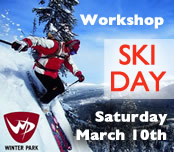About
Welcome to the 2012 Arctic Workshop!
The 42nd Annual International Arctic Workshop will be held 7-9 March 2012 in Winter Park, Colorado.
Please join our annual gathering of international researchers to present your work on any aspect of high-latitude environments (past, present, and future). We strive for a relaxed, friendly, and interactive experience, fostered in part by our relatively small size. And unlike most meetings, you can present your very latest research; the abstract deadline is only 3 weeks before the Workshop. Student participation is strongly encouraged, with partial support available to those making presentations (limited number of slots).
The meeting is open to all interested in the Arctic, and will consist of a series of talks and poster sessions covering all aspects of high-latitude environments. Previous Arctic Workshops have included presentations on arctic and antarctic climate, archeology, environmental geochemistry, geomorphology, hydrology, glaciology, soils, ecology, oceanography, Quaternary history, and more. A traditional strength of the Workshop has been Arctic paleoenvironments.
 Support for Students
Support for Students
Student participation is a vital component of this workshop. Financial assistance is available for a limited number of students from any country giving a talk or presenting a poster thanks to support from the National Science Foundation (Arctic Natural Sciences Program). Note that we cannot support as many students as in the past, so submit your abstract early.
Supported Student Presenters will be provided with the following:
- FREE Registration
- FREE Hotel, shared occupancy at Winter Park Hotel for up to 4 nights.
- Check in: Tuesday March 6th
- Check out: Saturday March 10th
- If you want to stay Saturday night or longer (to ski, etc), you will need to pay for the extra nights. But the hotel will give you the discount rate if you book before the deadline.
- FREE Meals, Breakfast and lunch provided on Wednesday, Thursday, and Friday. Dinner on Wednesday & Thursday.
Sorry, there is no support available for travel expenses (flights, shuttles, etc).
Sorry, but there is no support available for Student Presenters after our free slots are gone.
For more details, see Student Support
Host

Institute of Arctic and Alpine Research
University of Colorado at Boulder
INSTAAR's researchers uncover and communicate processes concerning earth and environmental systems—matters that are becoming ever more urgent as changes in climate and land use are felt worldwide.
Our traditional focus has been on polar and alpine regions, where effects of global change are especially pronounced. In recent decades,our research has broadened to include environmental challenges that span local, regional, and global scales. Our field sites are located across all seven continents and the world’s oceans.
DEADLINE EXTENDED
Registration & Abstracts due
Wednesday 22 February 2012
 Winter Park, CO
Winter Park, CO
This years' workshop will be held at the Winter Park Hotel, in Winter Park, Colorado. The hotel is located about 2 hours drive from the Denver International Airport and immediately adjacent the Winter Park Ski Area. Direct shuttles between Winter Park and Denver International Airport run every hour to 1.5 hours.
Free Wireless
Free wireless internet access is available throughout the Hotel (much better coverage and quality than 2010 Workshop).
 Special Events
Special Events
TUES. EVE Reception & Registration
We will host a pre-Workshop Reception and Registration on the evening of Tuesday 06 March, ca. 5-8 pm. Details to be posted later.
THURS. EVE Dinner & Keynote
|
Julie Brigham-Grette Professor of Geosciences University Massachusetts Amherst |
"(Arctic) Confessions of a Woman Who Can't Say No"
Brigham-Grette will draw on decades of experience doing field work in Russia and other areas of the Arctic. Her informative (and perhaps amusing) talk centers on international collaboration, persistence and serendipity (see more about the keynote).
SATURDAY SKI DAY
Please join us for our post-Workshop Saturday SKI DAY. You can buy discount lift tickets via our Workshop registration system and save up to $34 per ticket! See our Winter Park page for more details. The hotel will extend your discount rate too.
Sponsor

National Science Foundation's
Office of Polar Programs - Arctic Natural Sciences
NSF is helping support student participation in the Workshop.
Any opinions, findings, and conclusions or recommendations expressed on this website and in the Program & Abstracts volume are those of the author(s) and do not necessarily reflect the views of the National Science Foundation.
Image above:
James Balog (Photographer, Extreme Ice Survey, and INSTAAR affiliate) sits with his daughter Simone and Adam LeWinter (EIS, now CRREL) besides the terminus of the Columbia Glacier in Alaska's Chugach Range. The Extreme Ice Survey, together with glaciologists Tad Pfeffer (INSTAAR) and Shad O'Neel (USGS), and grad student Ethan Welty (INSTAAR), is using time lapse cameras to document, in unprecedented detail, the glacier's dynamic retreat. Photo: Ethan Welty (weltyphotography.com). August 2009.
Questions? Check our FAQ
or email us at
ArcticWS@colorado.edu
Supported by
The US National Science Foundation
OPP- Arctic Natural Sciences Program
Site built and
hosted by
INSTAAR


